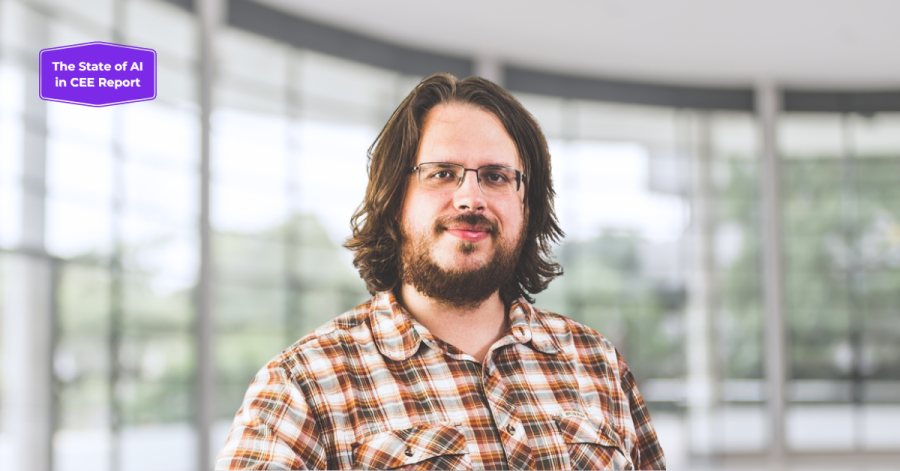“There will be a growing emphasis on cross-border knowledge sharing and stakeholder collaboration. As AI technology continues to evolve, it will be evident that no single region or company possesses a monopoly on innovation,” shares the co-founder, CTO, and Chief AI Architect at Rossum, Petr Baudiš.
Founded in 2017 in Prague, Czech Republic, by Tomáš Gogar, Petr Baudiš, and Tomáš Tunys, Rossum disrupts the ecosystem with its Intelligent Document Processing (IDP) platform that takes your documents from start to finish, fast. Hundreds of companies across a variety of industries use Rossum to power their document processing operation. Combining advanced, AI-powered data extraction with streamlined validation workflows and automation capabilities, Rossum helps process documents faster than traditional solutions.
To date, the company has secured one of the most notable Series A investments in the Eastern European ecosystem – $100 million – in 2021 from General Catalyst. Rossum’s total funding reaches $109.5 million.
The Recursive has sat down with Rossum’s co-founder, Petr Baudiš, to discuss the importance of automating business operations as well as the key opportunities and challenges AI startups in the CEE region face. As a programmer and Computer Science researcher with a background in Theoretical Computer Science and Artificial Intelligence, Petr serves at Rossum as the Chief Technology Officer and Chief AI Architect. Prior to co-founding Rossum, Petr co-founded Ailao, a company transforming deep-learning research into commercial products.
The following interview was conducted as a part of The Recursive’s “State of AI in CEE” report. Download the full report with insights from 40+ experts and an analysis of 900 AI product companies from CEE here.
The Recursive: How does Rossum leverage artificial intelligence, and what key features or aspects set your solution apart from the competition? What are your plans for the next 12-24 months?
Petr Baudiš: Rossum is an AI-powered platform that gives people back their time. Instead of spending hours copying and pasting data into sheets and cross-checking the validity to report on it eventually, users can now automate all this. Intelligent document processing means that it can all be done with much better accuracy, speed, and efficiency. We built Rossum from our core belief that AI should help teams focus on other value-creation activities, but ultimately, we’re focused on making B2B communication frictionless and seamless — without the need for endless email chains and confusion.
What distinguishes Rossum is not just our data extraction AI, but also the unified platform that provides customers with a holistic view of documents, simplifying the automation of entire business transaction workflows. This results in a significant reduction in manual intervention, typically needed in only about 10 percent of cases when documents require rework.
Artificial Intelligence plays a pivotal role in addressing the challenge of effectively handling the vast and intricate flow of documents exchanged across businesses daily. To put it into perspective, consider how Google Translate relies on AI; without it, the task would be unmanageable. Similarly, our approach involves the automation of complex manual processes through the development of a universal ‘translator’, bridging the gap between companies.
What sets us apart is our utilization of deep learning and neural networks crafted by dedicated scientists who are committed to ongoing innovation and product enhancement. Our machine learning model continuously improves, offering a fully-fledged solution that companies can implement without spending too much time integrating.
Our immediate roadmap centers on spearheading the next frontier of generative AI, particularly within the Large Language Model (LLM) landscape, and continuing innovation in the transformers space. We find ourselves at the epicenter of a quantum leap in our industry, and our primary objective is to make this profound transformation accessible to our users, thereby revolutionizing the entire product experience.
This advancement will empower users to autonomously handle business transactions and unlock valuable insights concealed within documents. It serves as a tangible example of how AI is poised to reshape our value proposition, ensuring we stay at the forefront of technological innovation and deliver even greater benefits to our users.
What is your perspective on the evolution of the AI startup landscape in the Czech Republic and the broader CEE region? What key trends are you observing?
Petr Baudiš: Below are some trends I see evolving in the CEE region’s AI startup ecosystem.
There will be an emergence of AI hubs, often clustered near academic institutions, that will result in a surge in startups. These academic resources drive innovation. However, governments lack comprehensive AI strategies for the future despite AI’s growing role in industries. This gap between thriving AI hubs and government strategy highlights the need for cohesive policy development and industry collaboration.
Additionally, what challenges or limitations do AI startups like Rossum face in the region?
Petr Baudiš: As for the challenges faced, I can mention two critical things.
In Central Europe, attracting the necessary talent can be a formidable task due to immigration restrictions and the difficulty of luring top-tier professionals to the region, even with financial incentives. Additionally, conducting global business from Central Europe can pose challenges. For example, imagine if the government subsidized direct flights between cities like Prague and New York, which would undoubtedly yield a positive GDP impact in the long run. While remote communication is prevalent, face-to-face interactions remain invaluable, fostering strong interpersonal connections and facilitating knowledge sharing within ecosystems.
What ethical principles and regulatory considerations guide your approach to developing and deploying AI solutions at Rossum?
Petr Baudiš: One of our foremost commitments revolves around transparency and trust with our customers. This entails not only ensuring the security of their data but also providing clear insights into how their data is handled throughout the AI solution’s lifecycle.
For instance, we implement stringent data protection measures, adhering to industry-leading security standards to safeguard sensitive information. We also provide transparent data handling practices, including clear data consent mechanisms, data access policies, and robust encryption protocols. This transparency is designed to empower our customers with a comprehensive understanding of how their data is utilized and to foster trust in our AI solutions.
Moreover, our commitment to ethical AI extends to continuous product improvement. We prioritize customer feedback and use it to enhance our solutions, ensuring they align with evolving ethical standards and customer expectations. By actively engaging with our customers and being responsive to their needs, we not only improve our product but also reinforce the trust that underpins our relationship with them.
In summary, our approach at Rossum revolves around transparency, data security, and continuous improvement, all aimed at building and maintaining the trust of our customers as we develop and deploy AI solutions.
How do you evaluate the current availability and quality of AI talent in the Czech Republic and CEE region? From your point of view, what are the most crucial AI specializations and skills in the region?
Petr Baudiš: When evaluating the current landscape of AI talent in the Czech Republic and the broader CEE region, we recognize that the region excels in engineering expertise but may face challenges in areas such as AI sales and business development. While the CEE region boasts strong engineering capabilities, AI sales require a global perspective and specialized skills that are not always readily available locally.
For example, in the Czech Republic, we often find a wealth of AI talent in areas like natural language processing (NLP), computer vision, and machine learning engineering. These specializations have thrived due to the presence of world-class academic institutions and research centers. However, when it comes to selling AI solutions on a global scale, which often involves intricate market knowledge, relationship building, and a deep understanding of customer needs, it may be necessary to tap into international talent pools.
Are there specific AI trends or advancements you believe will significantly impact the regional ecosystem over the next 5-10 years?
Petr Baudiš: Firstly, there will be a growing emphasis on cross-border knowledge sharing and collaboration among stakeholders. As AI technology continues to evolve, it will be evident that no single region or company possesses a monopoly on innovation. You can already see this in international partnerships, research collaborations, and open-source contributions like the one we were recently involved in when we published the world’s largest research dataset and benchmark.
This cross-border synergy can accelerate the development of AI solutions and elevate the CEE AI startup ecosystem.
Secondly, regulations will play a pivotal role in shaping the AI industry in this region. Governments and regulatory bodies are becoming more proactive in establishing guidelines and standards for AI applications, addressing concerns related to ethics, data privacy, and transparency. Compliance with these regulations will be crucial for startups operating in the AI space. For instance, the European Union’s General Data Protection Regulation (GDPR) has already had a profound impact on data handling practices, and similar regulations are likely to emerge in the AI sector. Preparing for these changes and being able to adapt quickly will prove crucial to the ecosystem’s sustainability. But in the end, the ball is now on the side of the government in defining regulations that are thoughtful and achieve critical objectives without suffocating the local AI ecosystem.
Third, as the CEE startup ecosystem matures, it’ll show that many of the most groundbreaking AI innovations will come from startups. Even when larger companies acquire these startups, the small, agile teams often continue to drive innovation within the parent organization. This trend underscores the importance of a maturing ecosystem in fostering innovation.
Furthermore, as current startups and scale-ups evolve into mature companies, they will contribute to creating a generation of alumni who bring their valuable experience and insights back into the ecosystem.
Think of the “PayPal Mafia” or the Ex-Googlers or Ex-Meta employees who have gone on to launch successful ventures. The knowledge and resources they bring back to the ecosystem can lead to significant leaps in innovation and growth.
In summary, cross-border collaboration, regulatory compliance, the influence of startups, and the contribution of alumni from mature companies are key trends that will shape the regional AI ecosystem in the coming years.







